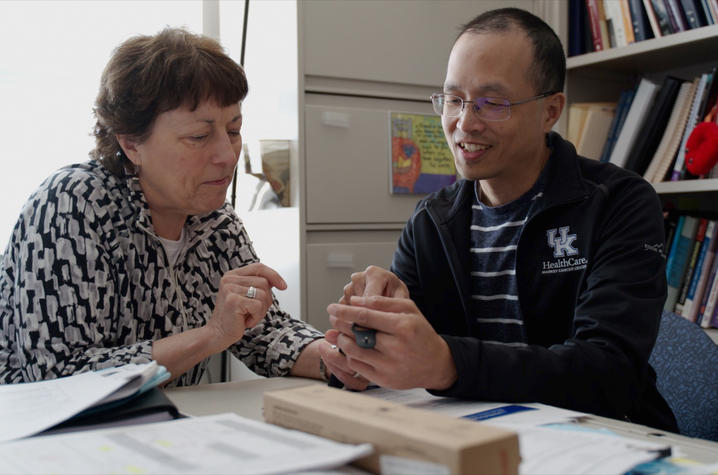College of Health Sciences’ Ming-Yuan Chih featured in ‘I am a UK Innovator’ series
LEXINGTON, Ky. (Oct. 25, 2022) — Better quality of life can be achieved through the power of innovation. Research Communications partnered with UK’s Office of Technology Commercialization (OTC) to spotlight faculty innovators with life-changing ideas at the University of Kentucky in the “I am a UK Innovator” video series. OTC works collaboratively with innovators to strategically assess, protect and license early-stage technologies and co-create new technology startups. In this final Q&A of the series Ming-Yuan Chih, Ph.D., describes a mobile health app he developed with his team to help bone marrow transplant patients during their recovery process. Chih is an associate professor of human health sciences and clinical leadership and management programs in the Department of Health and Clinical Sciences in the College of Health Sciences.
UKNow: What inspired you to become a researcher?
Chih: I was fortunate to work with David H. Gustafson, my research mentor, in his National Cancer Institute funded Center of Excellence for Cancer Communication Research. In my work with Dave and his team, we saw the huge impact that simple information technology-based interventions, such as a website or a smartphone app, can have on people’s health.
UKNow: Describe the innovation that you developed to help bone marrow transplant patients during their recovery process.
Chih: After receiving bone marrow transplantation (BMT), patients’ immune system is significantly ablated, which requires them to stay at the hospital for an extended period. At this stage, patients are faced with severe physical and emotional distress due to treatment side effects, isolation and physical inactivity. My team worked with patients, family caregivers and clinicians to co-design an Apple Watch app to boost patients’ recovery motivation, improve their physical activity and assist with symptom management.
UKNow: What is the most challenging aspect of your research?
Chih: The most challenging aspect of my research is working with BMT patients and their family caregivers during their most vulnerable time in life. BMT providers at the Markey Cancer Center play a key role in overcoming these challenges. BMT providers work diligently to provide the best care possible to both the patients and their families, and patients really trust them. With the support from BMT providers, we were able to reach out and work with BMT patients and their families.
UKNow: What have been the most exciting moments for you regarding your discoveries?
Chih: The most exciting moment to me is to see that patients’ lives are improved because of things we do. In our first pilot study, we found that those with this app had significantly improved physical activity and well-being than those without. It was great to hear patients’ comments on the app saying, “it is motivating.”
UKNow: What drew you to the University of Kentucky?
Chih: The people. Our students in the Clinical Leadership and Management (CLM) and Human Health Sciences (HHS) programs are very smart with enormous energy and a strong desire to become great healthcare providers. I also love my UK colleagues who are genuine, collaborative and creative. We also have great leadership at every level at UK, from my program, department, college, to the cancer center and the university.


As the state’s flagship, land-grant institution, the University of Kentucky exists to advance the Commonwealth. We do that by preparing the next generation of leaders — placing students at the heart of everything we do — and transforming the lives of Kentuckians through education, research and creative work, service and health care. We pride ourselves on being a catalyst for breakthroughs and a force for healing, a place where ingenuity unfolds. It's all made possible by our people — visionaries, disruptors and pioneers — who make up 200 academic programs, a $476.5 million research and development enterprise and a world-class medical center, all on one campus.




